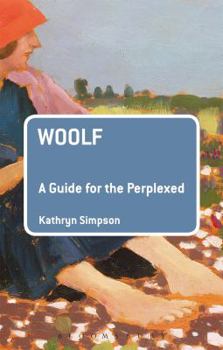Woolf: A Guide for the Perplexed
(Part of the Guides for the Perplexed Series)
Select Format
Select Condition 
Book Overview
Virginia Woolf is one of the best-known and most influential modernist writers; an iconic figure, her image and reference to her work and life appear in the most varied of cultural sites. Her writing is, however, in many ways kaleidoscopic and has given rise to a diverse and, sometimes, conflicting body of critical work. Whilst Woolf envisaged that her readers could be 'fellow-worker s]' in the creative process, there is much to perplex any reader approaching her writing, especially for the first time.
Drawing on some of the main critical debates and on Woolf's non-fictional writings, this guide untangles some of the difficulties and perplexities that can prove a barrier to understanding of Woolf's writing. These include aspects of the process of writing (such as narrative techniques, formal structures, characterisation), as well as the thematic concerns so central to Woolf's writing, the cultural context in which it emerged and to recent criticism, including representations of gender and sexuality, class and race.Format:Hardcover
Language:English
ISBN:1441169024
ISBN13:9781441169020
Release Date:February 2016
Publisher:Bloomsbury Academic
Length:216 Pages
Weight:0.85 lbs.
Dimensions:0.9" x 5.5" x 8.6"
Customer Reviews
0 rating





